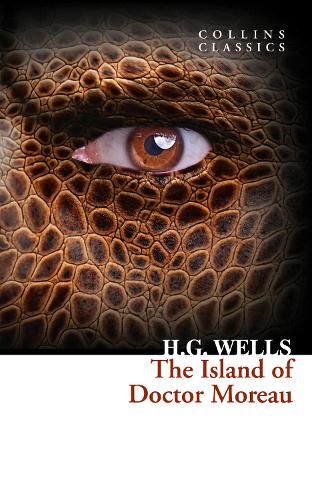
The Island of Doctor Moreau (Collins Classics)
(Paperback)
Publishing Details
The Island of Doctor Moreau (Collins Classics)
By (Author) H. G. Wells
HarperCollins Publishers
William Collins
2nd March 2017
26th January 2017
United Kingdom
Classifications
General
Fiction
Historical fiction
Autobiography: adventurers and explorers
Veterinary medicine: exotic and zoo animals
True stories of discovery
Animals and society / Animal rights - issues and debates
True stories of heroism, endurance and survival
Ethology and animal behaviour
823.912
Physical Properties
Paperback
192
Width 111mm, Height 178mm, Spine 12mm
110g
Description
HarperCollins is proud to present its incredible range of best-loved, essential classics.
That these man-like creatures were in truth only bestial monsters, mere grotesque travesties of men, filled me with a vague uncertainty of their possibilities far worse than any definite fear.
Edward Prendick, the sole survivor of a shipwreck in the South Pacific, is set ashore on an island where he meets the mysterious Doctor Moreau. Horrified by the discovery that Moreau is performing vivisection on animals to form monstrous human hybrids, Prendick flees into the jungle. But he soon realises that the island is populated with Moreaus terrible creations, and not all are divested of their savage habits . . .
H. G. Wells pioneered ideas of society, science and progress in his works, which are now considered modern classics. Written in 1896, The Island of Doctor Moreau is an imaginative exploration of the nature of cruelty and what it means to be human.
Reviews
The Island of Doctor Moreau takes us into an abyss of human nature. This book is a superb piece of storytelling V. S. Pritchett
[Wells work is] astonishingly rich in human and historical interest he foresaw the invention of, among other things, television, tanks, aerial warfare and the atom bomb David Lodge
I personally consider the greatest of English living writers [to be] H. G. Wells Upton Sinclair
The father of science fiction Guardian
Author Bio
Herbert George Wells's (1866-1946) career as an author was fostered by a childhood mishap. He broke his leg and spent his convalescence reading every book he could find. Wells earned a scholarship at the Norman School of Science in London. Wells's "science fiction" (although he never called it such) was influenced by his interest in biology. H. G. Wells gained fame with his first novel, The Time Machine (1895). He followed this with The Island of Dr. Moreau (1896), The Invisible Man (1897), and The War Of The Worlds (1898).
